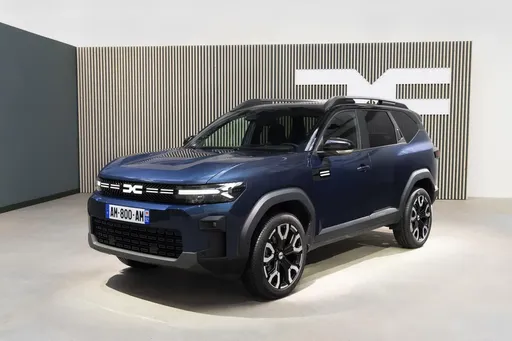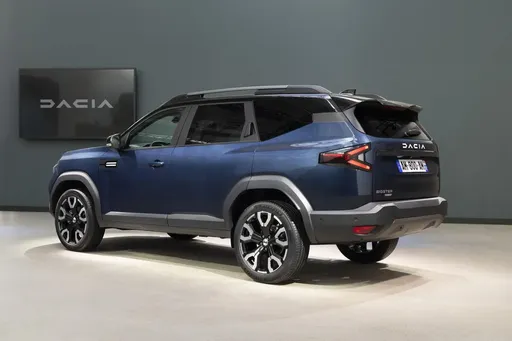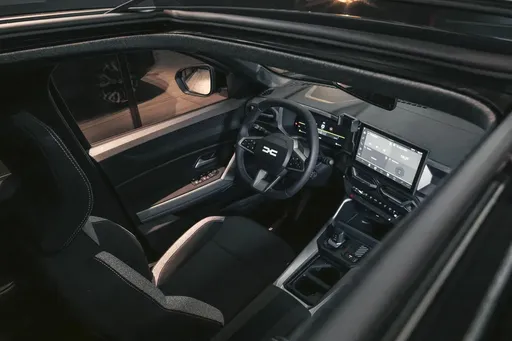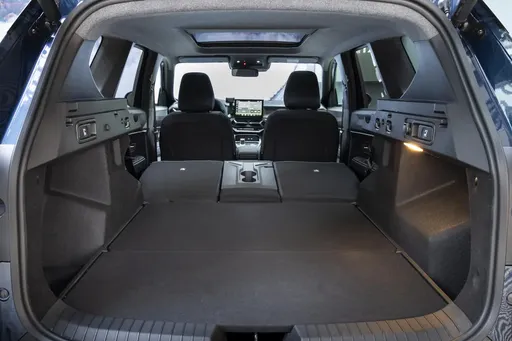Ford Transit Courier vs Dacia Bigster – Różnice i ceny w porównaniu
Koszty i zużycie
Cena i efektywność to kluczowe czynniki przy zakupie auta – właśnie tu często widać największe kontrasty.
Ford Transit Courier ma minimalny przewagę cenową – jego cena zaczyna się od 97000 zł, podczas gdy Dacia Bigster kosztuje 105400 zł. Różnica wynosi około 8412 zł.
W spalaniu również widać różnice: Dacia Bigster zużywa 4.70 L i jest tym samym niewielki oszczędniejszy niż Ford Transit Courier, który spala 5.10 L. To około 0.40 L różnicy na 100 km.
Silnik i osiągi
Moc, moment obrotowy i przyspieszenie wiele mówią o tym, jak auto prowadzi się na co dzień. Tu widać, kto oferuje więcej dynamiki.
Pod względem mocy silnika Dacia Bigster ma lekko przewagę – 155 KM zamiast 136 KM. To różnica około 19 KM KM.
Różnica widoczna jest również w momencie obrotowym: Ford Transit Courier ciągnie czytelny mocniej – 290 Nm wobec 230 Nm. Różnica to około 60 Nm.
Przestrzeń i praktyczność
Wnętrze, bagażnik i ładowność mają kluczowe znaczenie w codziennym użytkowaniu. Liczy się komfort i elastyczność.
Miejsca siedzące: oferuje więcej miejsc – vs .
Pod względem masy własnej Ford Transit Courier jest nieco lżejszy – 1230 kg wobec 1425 kg. Różnica to około 195 kg kg.
W maksymalnej pojemności ładunkowej Ford Transit Courier wypada wyraźny lepiej – do 2900 L, czyli o około 963 L więcej niż Dacia Bigster.
Pod względem ładowności Ford Transit Courier wypada oczywisty lepiej – 710 kg wobec 467 kg. Różnica to około 243 kg kg.
Kto wygrywa pojedynek?
Ford Transit Courier okazał się dominuje w porównaniu i tym samym zdobywa tytuł DriveDuel Champion!
W tym porównaniu Ford Transit Courier to bardziej wszechstronny wybór.
 @ Ford Motor Company / Ford Media Center
@ Ford Motor Company / Ford Media Center
Ford Transit Courier
Koszty i Zużycie
Zobacz analizę szczegółową
Silnik i Wydajność
Zobacz analizę szczegółową
Wymiary i Nadwozie
Zobacz analizę szczegółową
Ford Transit Courier
Ford Transit Courier to sprytny, mały dostawczak dla miejskiego rzemiosła, który zaskakuje praktycznością i przestrzenią ładunkową bardziej, niż wygląda z zewnątrz. Prowadzi się pewnie w korkach, łatwo się parkuje i oferuje uczciwy pakiet funkcji — nie udaje vana premium, za to robi swoje solidnie i bez zbędnego blichtru.
szczegóły @ Ford Motor Company / Ford Media Center
@ Ford Motor Company / Ford Media Center
 @ Ford Motor Company / Ford Media Center
@ Ford Motor Company / Ford Media Center
 @ Ford Motor Company / Ford Media Center
@ Ford Motor Company / Ford Media Center
Dacia Bigster
Dacia Bigster to SUV, który stawia na praktyczność i rozsądek — prosty w obsłudze, przestronny i z charakterem, który nie udaje więcej niż jest wart. Dla osób szukających sensownego kompromisu między ceną a funkcjonalnością to solidna propozycja, która nie sili się na luksus, za to chętnie zabierze rodzinę i bagaże tam, gdzie trzeba.
szczegóły @ Dacia / Renault Group Media
@ Dacia / Renault Group Media
 @ Dacia / Renault Group Media
@ Dacia / Renault Group Media
 @ Dacia / Renault Group Media
@ Dacia / Renault Group Media
 @ Dacia / Renault Group Media
@ Dacia / Renault Group Media
 @ Dacia / Renault Group Media
@ Dacia / Renault Group Media
 @ Ford Motor Company / Ford Media Center
@ Ford Motor Company / Ford Media Center
|
 @ Dacia / Renault Group Media
@ Dacia / Renault Group Media
|
|
|
|
Koszty i Zużycie |
|
|---|---|
|
Cena
97000 - 159600 zł
|
Cena
105400 - 136100 zł
|
|
Zużycie L/100km
5.1 - 6.9 L
|
Zużycie L/100km
4.7 - 7.1 L
|
|
Zużycie kWh/100km
17.10 kWh
|
Zużycie kWh/100km
-
|
|
Zasięg elektryczny
293 km
|
Zasięg elektryczny
-
|
|
Pojemność baterii
43.50 kWh
|
Pojemność baterii
-
|
|
CO2
0 - 158 g/km
|
CO2
106 - 137 g/km
|
|
Pojemność zbiornika paliwa
44 - 45 L
|
Pojemność zbiornika paliwa
50 - 55 L
|
Wymiary i Nadwozie |
|
|---|---|
|
Typ nadwozia
Van
|
Typ nadwozia
SUV
|
|
Miejsca siedzące
2 - 5
|
Miejsca siedzące
5
|
|
Drzwi
3 - 5
|
Drzwi
5
|
|
Masa własna
1230 - 1549 kg
|
Masa własna
1425 - 1547 kg
|
|
Pojemność bagażnika
-
|
Pojemność bagażnika
510 - 667 L
|
|
Długość
4337 - 4344 mm
|
Długość
4570 mm
|
|
Szerokość
1800 - 1813 mm
|
Szerokość
1813 mm
|
|
Wysokość
1819 - 1839 mm
|
Wysokość
1705 mm
|
|
Maksymalna pojemność bagażnika
2400 - 2900 L
|
Maksymalna pojemność bagażnika
1813 - 1937 L
|
|
Ładowność
529 - 710 kg
|
Ładowność
383 - 467 kg
|
Silnik i Wydajność |
|
|---|---|
|
Typ silnika
Benzyna, Diesel, Elektryczny
|
Typ silnika
Mild Hybrid Benzyna, Pełna Hybryda, LPG
|
|
Skrzynia biegów
Manuel, Automatyczna
|
Skrzynia biegów
Manuel, Automatyczna
|
|
Szczegóły skrzyni biegów
Manualna skrzynia biegów, Automatyczna dwusprzęgłowa, Reduktor
|
Szczegóły skrzyni biegów
Manualna skrzynia biegów, Zautomatyzowana manualna
|
|
Rodzaj napędu
Napęd na przednie koła
|
Rodzaj napędu
Napęd na cztery koła, Napęd na przednie koła
|
|
Moc KM
100 - 136 KM
|
Moc KM
130 - 155 KM
|
|
Przyspieszenie 0-100km/h
-
|
Przyspieszenie 0-100km/h
9.7 - 11.2 s
|
|
Maksymalna prędkość
-
|
Maksymalna prędkość
180 km/h
|
|
Moment obrotowy
170 - 290 Nm
|
Moment obrotowy
230 Nm
|
|
Liczba cylindrów
3 - 4
|
Liczba cylindrów
3 - 4
|
|
Moc kW
74 - 100 kW
|
Moc kW
96 - 115 kW
|
|
Pojemność silnika
998 - 1499 cm3
|
Pojemność silnika
1199 - 1799 cm3
|
Ogólne |
|
|---|---|
|
Rok modelowy
2023 - 2025
|
Rok modelowy
2025
|
|
Klasa efektywności CO2
E, D, A, F
|
Klasa efektywności CO2
E, D, C
|
|
Marka
Ford
|
Marka
Dacia
|
Jakie rodzaje napędu ma Ford Transit Courier?
Ford Transit Courier jest dostępny z napędem Napęd na przednie koła.
Wyświetlane ceny i dane są szacunkowe, oparte na niemieckich cenach katalogowych i mogą się różnić w zależności od kraju. Te informacje nie stanowią wiążącej oferty.
